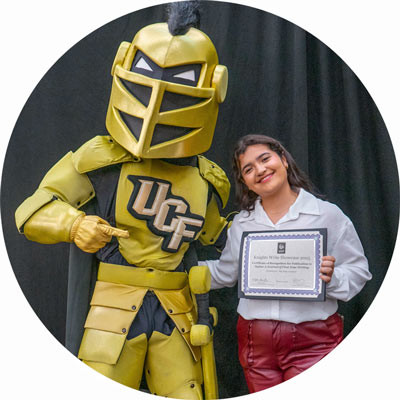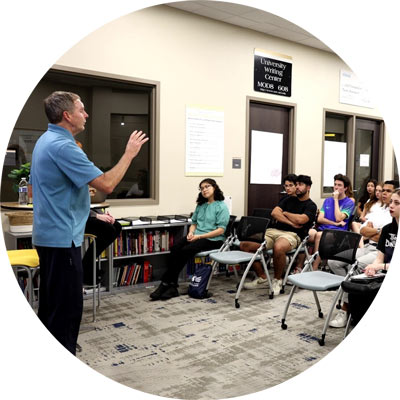
Writing Across the Curriculum
Center websiteThe Writing Across the Curriculum (WAC) program continues to play a vital role in raising awareness of the many forms and functions of writing in today’s information-rich, technology-driven world. At UCF, students, faculty and alumni write every day — whether through text messages, lab reports, social media posts, grant proposals, emails or essays. Writing remains a foundational skill that extends well beyond writing-intensive courses.

Yet, access to the latest writing research and strategies often ends after required writing coursework. To bridge this gap, WAC offers a range of programs that help faculty and students refine writing strategies tailored to specific fields, disciplines and professions.
The WAC Wednesday professional development series featured four workshops, with an emphasis on artificial intelligence and reflective writing. The fall series included interdisciplinary workshops like “Red Light, Green Light: Using a Stoplight Metaphor to Promote Transparency in AI Usage” facilitated by Taylar Wenzel, senior lecturer in the School of Teacher Education, and Michelle Kelley, professor of reading education. Both facilitators are former participants in the WAC track at the UCF Summer Institute, where they first developed the strategies presented in this session. The spring series drew on current research by writing studies faculty, including Shane Wood, Matthew Bryan, Lissa Pompos-Mansfield, Megan Lambert and Laurie Pinkert. These sessions offered attendees direct access to UCF-based writing research and innovative tools for enhancing AI-literacy and reflective awareness.
WAC collaborated with campus partners to offer programs during the UCF Summer Institute, sponsoring seven faculty members for the WAC track, a three-day intensive focused on writing-related needs in courses and academic programs. This year’s cohort included faculty from the Colleges of Sciences, Medicine, Community Innovation and Education, and Arts and Humanities. The institute-wide WAC workshop, “Always Amid Changing Expectations: What Do Generative Artificial Intelligence Writing Tools Mean for Your Classes?” drew a standing-room-only audience. UCF faculty remain eager to explore how AI is impacting experiences with writing, and the WAC program plays a key role not only in fostering conversation but in conducting relevant research.
In October, WAC once again led UCF’s celebration of the National Day on Writing. Initiated in 2009 and celebrated annually, the National Day on Writing recognizes the roles that writing plays in our everyday lives. UCF’s event, “Write Here, Write Now, Write On,” engaged over 100 students in sharing their writing experiences and motivations. The event also emphasized writing’s role in civic life, providing students with resources on how to contact elected representatives and how to use their writing to make their voices heard in the political conversations that will shape their futures.
In 2024-25, the WAC program benefitted from the leadership of Lissa Pompos Mansfield, who coordinated both the National Day on Writing and the WAC Wednesday series during Director Laurie Pinkert’s research sabbatical Her contributions, along with those of many faculty collaborators, helped expand the program’s reach and impact. We are excited to build on this momentum. If you have an idea for a WAC program or a research collaboration, we’d love to hear from you!
— Laurie A. Pinkert, director
University Writing Center
Center websiteThe University Writing Center (UWC) serves as a vital resource for students and faculty seeking feedback on writing projects. In the 2024-25 academic year, the center saw a 6% increase in student visits compared to the previous year. Community outreach efforts also surged, rising 71% year over year.

Outreach activities included workshops, special events, classroom visits and tabling at university events. One notable event was a workshop featuring Stephanie Wheeler, associate professor in the Department of Writing and Rhetoric, and Aubrey Jewett, associate professor in the School of Politics, Security, and International Affairs. The two led a discussion on rhetoric and politics, which drew students from across disciplines and sparked a lively discussion.
Peer consultant Hannah Benton, a recent graduate of the Department of Writing and Rhetoric, presented a poster at the Conference on College Composition and Communication in Baltimore in April. She also shared her research at the National Conference on Undergraduate Research. Fellow peer consultants Emma Drauer, Marina Habib and Hannah Benton successfully defended their honors theses in spring 2025.
One of the center’s major initiatives this year was synchronous online writing groups in partnership with First-Year Composition courses. The goal was to assess whether participation in weekly writing groups improved students’ motivation, self-efficacy and sense of belonging.
This initiative lays the groundwork for fall 2025, when the UWC will again host writing groups in collaboration with the First-Year Composition Program. This project is part of the Department of Writing and Rhetoric’s participation in a U.S. Department of Education National Institute for Student Success grant, that incorporates non-generative AI technology via a chatbot that nudges writers in hopes of better supporting students’ academic success and students’ sense of belonging.
Along with our newsletter, the drop-in drafting lab, outreach efforts, and our continued research conversations surrounding GenAI tools, the UWC continues to thrive. Ninety-seven percent of students rated their visit to the center as excellent or above average. The University Writing Center remains a dynamic space where learning, writing and research flourish.
— Debbie Weaver, director
